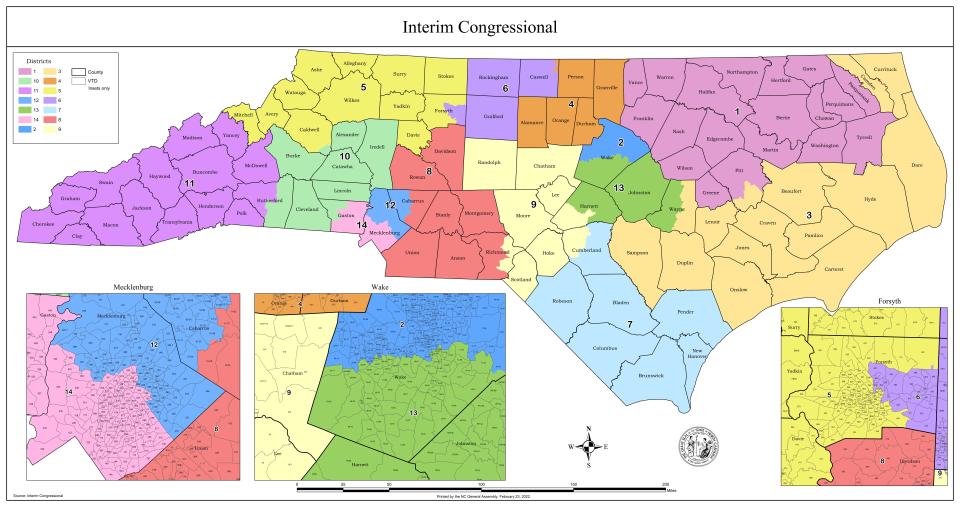Pitts: ‘Hey, Dad.’ Me, on NC gerrymandering, Sam on everything else
“Gerrymander” is one of my least favorite words in politics.
It is an interesting word with an interesting history, so that’s not the problem.
My problem is that when you start talking about gerrymandering to people who do not follow every twist and turn of politics — i.e. normal people — their eyes glaze over. The long, funny-sounding word gets in the way of understanding. Most especially when you start talking in strings about “extreme partisan gerrymandering” like I’m about to.
More: Pitts: Fayetteville's Applewhite explains surprising vote for anti-transgender sports bill
I am hunting for an alternative word that can move the people. Let me know if you find one.
Because the people should know all about extreme gerrymandering — enough to protest it, show up in meetings against it, run it into the ground or blast if off the face of the earth. Gerrymandering takes away voters’ choices. This poisons democracy — even more than money, and that is saying something.
More: Pitts: DeSantis, Pence idea to bring back Bragg name just dumb
You’ve heard the expression One Person, One Vote etc. forever and ever amen. The explicit goal of extreme gerrymandering is to make sure nothing crazy like “One Person, One Vote” ever happens.
So I’m going to attempt to write a column on gerrymandering you’ll get to the end of. I got some help from my son, Samuel, an extremely curious 10-year-old.

See, Sam has this thing where he will ask me if I know some random fact that he picks up from books or YouTube. They are usually true and all very interesting.
So I will pepper this polemic on gerrymandering with mini versions of my conversations with Sam.
Now if you’re wondering why this format makes sense: It does not.
But here is one.
SAM: Hey, Dad.
ME: Yes, Sam.
SAM: Did you know that the nucleus of an atom compared to the atom is like a fly in a cathedral?
ME: What? That’s actually hard to believe.
In North Carolina and other states, the party in the majority gets to draw Congressional districts on U.S. Census years, which is every decade. Because of legal challenges, the drawing and redrawing of districts can proceed for years after the Census. That is the case in our state.
The goal of extreme gerrymandering is simple. The goal is to make sure the party in charge draws the vast majority of districts for U.S. Congress in a way that the other party cannot reasonably hope to win. That’s the general idea. Mapmakers achieve this by way of sophisticated computer software.
The long-term goal of some parties is to use gerrymandering to pound the other party into the dust, along with all its ideas and the hopes and dreams of people with the gall to share those ideas.
I have heard gerrymandering described as the politicians picking its voters, not the other way around. The nonpartisan Brennan Center for Justice has called gerrymandering “deeply undemocratic.”
I have also heard gerrymandering called rigging elections. We may call it a “naked power grab” if we wish.
Shall I go on with these comparisons? I shall not.
SAM: Hey, Dad.
ME: Yes, Sam.
SAM: Did you know that the amount of house cats that exist can stretch six times around the Earth?
ME: Really? I’m trying to picture Rosie and Ruthie in that string of cats. I kind of don’t like it, I guess.
SAM: But just seeing a bunch of cute little kittie cats …
The way the Republicans in North Carolina do gerrymandering is this: They slice off a part of a blue county like Cumberland and put that portion in a district with a lot of rural red counties.
The Republican map drawers use the following reasoning: Cities and heavily populated counties are mostly Democratic when it comes to voting patterns, i.e. “blue,” and rural areas are mostly Republican, i.e. “red.”
This strategy has worked well for Republicans in a state like ours that has a few larger metros surrounded by rural areas.
In 2018, a brutal Republican gerrymander led to a situation where Republicans actually had fewer total votes cast for their candidates across the state but still managed to send 10 Republicans to Congress and three Democrats. It was a work of dark art.
Now, if you are wondering if gerrymandering can be applied to state races, too, it can, it has been and it will be in the future.
SAM: Hey, Dad.
ME: Yes, Sam.
SAM: Do you know what two countries had the same flag until the 1936 Olympics, and they didn't know it?
ME: No, can’t say that I do.
SAM: Haiti and Liechtenstein.
ME: Hmm.
SAM: A blue and red horizontal split, with blue on the top and red on the bottom. They realized the flags were identical at the 1936 Olympics and changed them. Liechtenstein’s new flag was the same, but there was a yellow crown added in the top-right corner, and Haiti’s also stayed mostly the same, but they added an emblem in the center.
ME: Wow.

Now here’s the thing. The current maps for Congressional Districts in North Carolina are pretty fair. The North Carolina delegation to Congress includes seven Democrats and seven Republicans. That’s a nice even 14 — after we added a seat with the 2020 Census, because the state is growing.
There is a specific reason the maps this time are fair. The courts drew them last year after maps that were much more gerrymandered by Republicans were challenged and struck down by the N.C. Supreme Court, which then had a Democratic majority.
In the fall, Republican judge candidates won enough statewide races to take control of the state Supreme Court. Interestingly, the judge races could not be gerrymandered because the whole state votes for the seats. The Republicans just straight up cleaned the Democrats’ clock, old school.
(The other way to look at it is that Republicans can clearly win without gerrymandering. So this tells me they are not looking to just win but to decimate.)
Then in April, the new Republican-majority court overturned the court's own past ruling on gerrymandering. There is every expectation that the GOP will redraw the Congressional districts back to a very partisan gerrymander.
SAM: Hey, Dad.
ME: Yes, Sam.
SAM: Did you know Nintendo once made card games?
ME: Before they made video games?
SAM: Yes.
ME: (pondering.) Is there a Mario card?
SAM: I don’t think Mario was invented yet.
Our state has sometimes found itself at the center of the political universe when it comes to extreme gerrymandering. That is no compliment. The late Thomas Hofeller, who is considered by many the father of extreme GOP gerrymandering, lived in Raleigh.
We were front and center again this week.
The U.S. Supreme Court ruled against North Carolina Republicans who tried to claim that when it comes to gerrymandering, the state Supreme Court should not be able to do what it did in 2022 and force a redraw of districts. Political people call this theory aka scheme the “independent state legislature,” and it would mean whatever gerrymandered district a party comes up with stays, no matter how undemocratic (small d). It would have had broad implications across the whole U.S.
But this was too much for even this very far-right Supreme Court, which voted 6 to 3 to shoot down the NC Republicans.
SAM: Hey, Dad.
ME: Yes, Sam.
SAM: Did you know there was a ruler who was the only person to control the price of gold by himself? He had gold at his fingertips.
ME: Really? Hmm.
SAM: Mansa Musa.
ME: Who?
SAM: Mansa Musa.
ME: What country was he from?
SAM: Mali.
Are you the least bit surprised to learn the U.S. Supreme Court decision does not end the saga of gerrymandering in NC? Because North Carolina's highest court gutted its own power to stop gerrymandering, the foul practice can proceed as usual.
Don’t take my word for it. Ask Dallas Woodhouse, a Republican political operative who is typically in the know. He throws out sharp elbows but he is also one of those people in politics who will say the quiet part out loud, and I have to respect that.
Reacting to the U.S. Supreme Court decision, he tweeted: “Let’s remember that Moore v Harper #SCOTUS decision will have no impact on this years redrawing of NC Congressional districts which could net (NC Republicans) 2-4 seats.”
“Net” is a good word because it kind of captures of how these two to four extra Republican seats will just be hunted and scooped up in a net by redrawing districts.
No voters needed.
SAM: Hey, Dad, I got a joke.
ME: OK ...
SAM: Can adults surf the internet?
ME: I’m going to say yes?
SAM: Actually, no. They ADULT SWIM. (Breaks into laughter.)
ME: Good one.
He’s here all night, folks, and I am so glad.
Samuel J. Pitts contributed to this column.
Myron Pitts can be reached at mpitts@fayobserver.com or 910-486-3559.
This article originally appeared on The Fayetteville Observer: Pitts: ‘Hey, Dad.’ Me, on NC gerrymandering, Sam, on everything else

